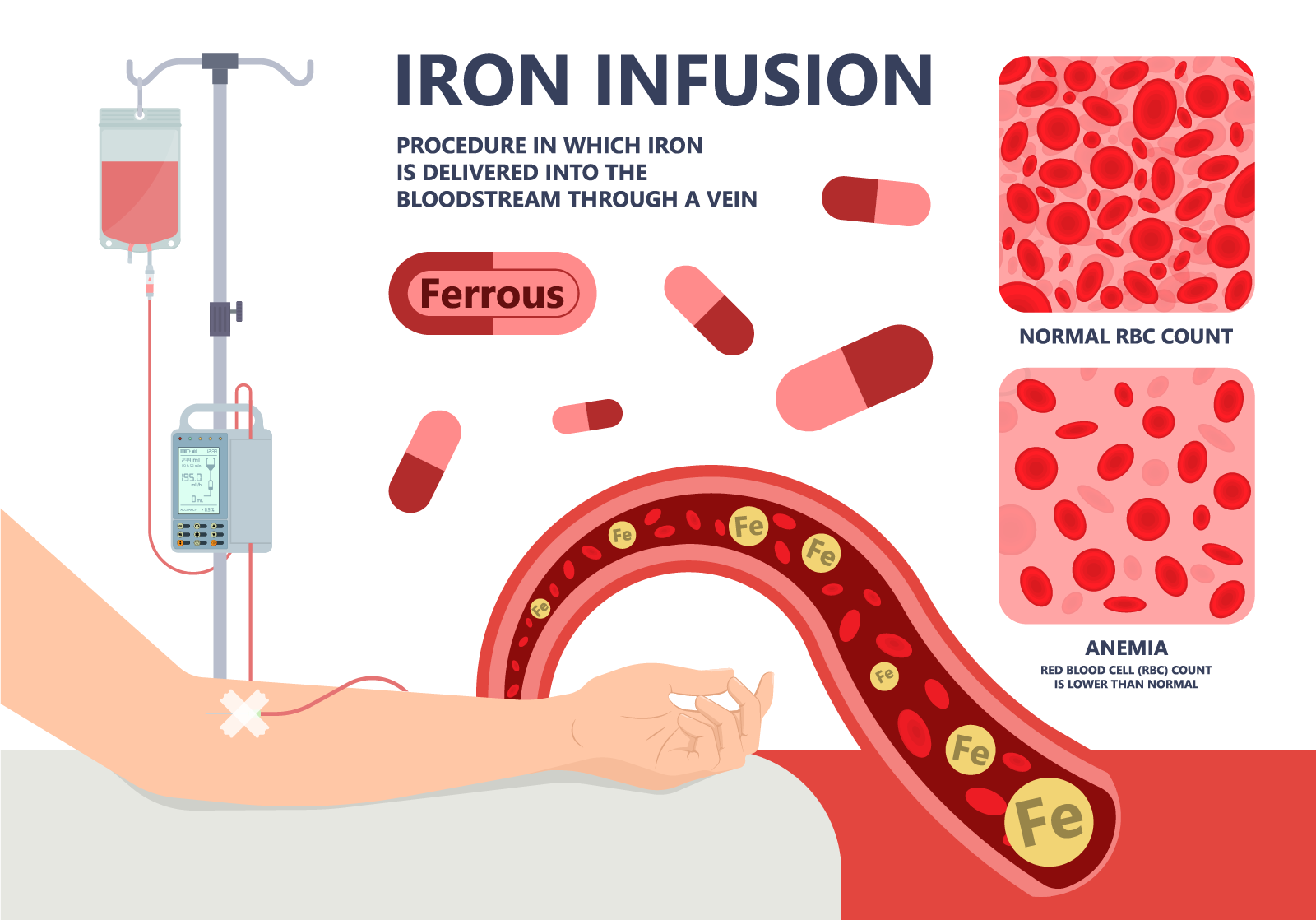Research led by Johns Hopkins Medicine published in July 2024 in Anesthesia & Analgesia compared the outcomes of patients with iron-deficiency anemia receiving preoperative intravenous (IV) iron to those getting preoperative blood transfusions.
Significant improvements in health outcomes with iron infusions
The research team utilized medical records from 2003 to 2023 using the TriNetX Research Network. Drawing on more than 154,000 patients, this study used matched samples based on demographic factors like age and sex, health conditions, type of surgery, and blood parameters.
The study found that those receiving IV iron before surgery had:
- Lower 30-day postoperative mortality (3.3% with IV iron vs. 5.2% with blood transfusions)
- Lower rates of postoperative complications (18.4% with IV iron vs. 24.1% with blood transfusions)
- Higher hemoglobin levels 30 days after surgery (10.1g/dL with IV iron vs. 9.4g/dL with blood transfusions)
- Less need for additional blood transfusions after surgery (4.9% with IV iron vs. 16.4% with blood transfusions)
This translates to a 37% reduction in mortality and a 24% reduction in postoperative complications for those who received iron infusions before surgery. The evidence suggests that iron infusions not only optimize a patient’s blood health before an operation but also reduce the need for transfusions and their potential risks after surgery.
Iron infusions: a life-enhancing solution for iron deficiency anemia
Iron deficiency anemia is one of the most common blood disorders worldwide. It arises when the body doesn’t have enough iron to produce healthy red blood cells, which are essential for carrying oxygen throughout the body. Common symptoms include fatigue, weakness, pale skin, shortness of breath, and dizziness. Blood loss, poor diet, reduced absorption, and conditions like pregnancy are leading causes of iron deficiency anemia.
Iron is required to make hemoglobin, the protein in red blood cells responsible for oxygen transport. Without enough iron, the body cannot generate sufficient hemoglobin, resulting in diminished oxygen delivery to tissues and organs. People with iron deficiency anemia may feel unusually tired, have poor concentration, and experience a significantly reduced quality of life.

While oral iron supplements are the typical treatment for iron deficiency, they don’t work well for everyone—particularly those with absorption difficulties, severe anemia, or who need their iron levels raised rapidly (such as before surgery). In such cases, iron infusions, given intravenously, offer a safe and effective alternative.
The problem with blood transfusions for surgery
Blood transfusions before or after surgery have been the standard of care for individuals with iron deficiency anemia. While blood transfusions reduce anemia, they carry significant risks, including blood clots, infections, allergic reactions, and pulmonary complications. It can also be difficult to find a donor match if a patient has certain antibodies or a condition such as sickle cell disease.
As a result, physicians have long sought strategies to minimize the use of transfusions. In fact, blood transfusions were listed in a 2012 American Medical Association review of overused medical procedures. This report noted that blood transfusions were used in 10% of all hospital stays including a procedure — and more than 60,000 adverse reactions to blood transfusions occurred in a single year.
Will preoperative iron infusions replace blood transfusions?
The recent study by researchers from Johns Hopkins supports the use of iron infusions for patients with iron deficiency anemia who are undergoing surgery. They found that iron infusions offer a safer, more effective approach than conventional blood transfusions. Iron infusion can boost the body’s natural ability to produce healthy red blood cells, minimize exposure to blood products, and improve overall recovery and outcomes.
Dr. Steven Frank, professor of anesthesiology and critical care medicine at the Johns Hopkins University School of Medicine, noted: “… our retrospective study showed a benefit of iron infusions over preoperative blood transfusions in decreasing morbidity and mortality, increasing hemoglobin and decreasing the need for blood transfusions.”
While the recent study is promising, previous reviews of clinical trials have not found the same improvements following surgery. In several meta-analyses, iron infusions increased hemoglobin levels in patients before surgery, but there was little evidence for better outcomes. A 2025 meta-analysis reported that iron infusion before surgery improved hemoglobin recovery while iron infusion after surgery reduced the need for blood transfusion.
As is often the case, differences in patient populations and research methods can result in different research findings. However, to reduce the risk and expense of blood transfusions, preoperative iron infusions are becoming a preferred treatment for patients with iron deficiency anemia undergoing surgery.
Learn more about the symptoms and health impacts of iron deficiency and anemia. If you’re scheduled for surgery, talk to your healthcare provider about iron deficiency testing and methods to improve your surgical recovery.
See our web page on iron deficiency, and read our other news articles on the topic.


